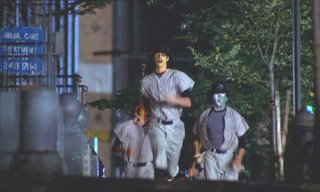The Warriors: Walter Hill comes down with George Lucas-itis

Don't mess with perfection. Or at least with anything that was perfectly worthwhile the first time through. That's my humble but emphatic plea to any director out there who's following George Lucas' anal-retentive lead.
You can add Walter Hill, the oft-underrated tough-guy auteur who helmed some of the best white-knuckle action flicks of the last three decades, to the ranks of the Anal Tinkerers. He's taken his 1979 cult opus, The Warriors, and glopped it up with some needless tinsel and obvious visual cues (more on that later) for the new 'Ultimate Director's Cut'. Blessedly, the movie stands up nicely despite the tinkering, and in all fairness, the lengthy documentary on the new edition's pretty spiffy, too.
The screenplay by Hill and David Shaber strips the ambiguity of Sol Yurick's earnest social drama novel away, leaving an essentially straightahead adventure in its place. In the movie, nine members of the titular Coney Island street gang travel to New York for a huge summit meeting of all of the city's gangs. During the meeting, an important figure in the gang community gets wasted, and the real killer, Luther (David Patrick Kelly) fingers the Warriors as the trigger men. It's up to Swan (Michael Beck), the Warriors' de facto leader, to get his brothers out of NYC and back to Coney Island in one piece.
The Warriors started out its original thatrical release in 1979 at the top of the box office heap, but its gang-related subject matter drew decidedly rough elements into screenings. Violence and riots forced controversy-phobic Paramount Pictures to essentially yank the movie from theaters. The movie died on the vine, and it took two decades of cult idolatry and critical re-evaluation to give it a second life.
Paramount deserves a fair share of the blame for blowing it the first time around. Clueless as to how to market The Warriors, they touted it as an exploitation piece in the vein of Death Wish. The original ads and promotional materials included menacing copy about how New York street gangs "outnumber[ed] the cops three-to-one". Small wonder Joe and Jane Q. Public stayed away, and the moviehouses in urban areas filled with gangbangers itching for a fight.
But while the studio-borne promotion promised ugly, exploitive thrills, Hill and company delivered a robust, larger-than-life action fantasy that owes more to Howard Hawks, Marvel Comics, and Akira Kurosawa than it does to Charles Bronson's numb avenging-angel allegories. At a time when the notion of a stylish comic-book movie played without tongue-in-cheek was still pretty exotic, The Warriors stood out. And it still does.
For starters, the movie's nowhere near as brutal as those ads made out. Even modern film references flog that misconception to this day (check out the All Movie Guide's entry on The Warriors for a classic case of someone just not getting it), but truth be told, little blood is spilled. Like all of the best action directors, Hill gets maximum mileage out of the anticipation of violence; Swan takes his troops through the mean streets attempting to avert conflict, and the Warriors only fight when absolutely necessary. The resulting sharply choreographed fight scenes feel well-earned and exhilarating--not base, gratuitous, or ugly.
The movie's surreal vision of New York plays like equal parts amusement park and gladiatorial arena. The director deliberately keeps 'regular' New York bystanders (almost) totally out of the picture--no innocents are harmed. The gangs and their members all play the key roles, but they clearly hold no basis in raw urban reality. Beck's stalwart and altruistic Swan comes straight out of a Kurosawa epic; Tough-talking hooker-with-a-heart-of-gold Mercy (Deborah Van Valkenburgh) takes her cue from many a Howard Hawks western; James Remar's funny and hot-headed troublemaker Ajax welds The Good The Bad and the Ugly's Tuco and The Three Musketeers' Porthos; the gentle but resolute Rembrandt (Marcelino Sanchez) combines Sal Mineo sensitivity with classic second-banana loyalty and gumption; and Kelly's deliciously grating Luther plays like Elisha Cook Jr. on crystal meth. Hill lays these archetypes out with sci-fi vividness (Escape from New York, for one, owes a clear debt to his splashy directorial eye), but because all of the characters are played (very well) by relatively unfamiliar faces, any potential for campiness gets quite gracefully sidestepped. It also helps that the quotable dialogue straddles the perfect balance between minimalist toughness, hard-boiled humor, and theatrical grandiosity.
In its original form The Warriors' combination of vivid color, un-self-conscious enthusiasm and pulp iconography demonstrated one of the earliest examples of a comic-book movie by moviemakers who actually saw comics as an unpretentious-yet-viable form of expression. It's a shame Walter Hill can't leave well enough alone on the new 'Ultimate Director's Cut', inserting actual comic-book panels for scene breaks and grafting on an absurdly pretentious opening narration comparing Swan and his fellow Warriors to the lost Greek soldiers who fought their way out of Sparta in 400 BC.
All of this symbolism is already in the movie if you want to look for it, for Pete's Sake. We don't need the director grabbing us by the scruff of the neck and screaming it into our ear with a megaphone.


Comments